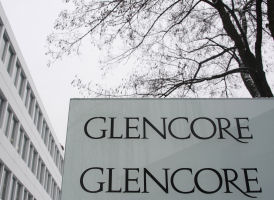Multi-billion pound valuation of commodity giant Glencore
Bigger than Tesco: the little-known commodity group Glencore prepares for a stock market flotation that could make its chief executive one of Europe’s wealthiest men.

The world was allowed a glimpse into the secretive world of commodity trading today, as the giant firm Glencore published a 1600-page prospectus as it prepares to go public.
The obscure company, based in Switzerland, has operations which reach across the world. It produces and trades in commodities as diverse as copper, zinc, iron, aluminium and lead; gold, oil and coal; and grain, cotton and sugar. Its turnover was a staggering £86bn last year – larger than Tesco – and its profits were £2.3bn.
It’s seeking to raise more money by selling shares for the first time on the London Stock Exchange. The terms of the offering will value the firm between £29bn and £35bn. The price is lower than previous estimates, and is likely to guarantee investors an instant profit when shares start trading later this month.
To meet exchange requirements Glencore has to reveal a huge amount of new information to investors. Most eye-catching of today’s revelations was the fact that the chief executive, Ivan Glasenberg, will have a 15.8% stake in the company after the float. That will be worth around £5.8bn, making him one of the wealthiest men in Europe. It’s around twenty times the estimated wealth of the Queen.
His colleagues will not miss out. Four other men are revealed as future billionaires – senior traders Daniel Mate: Telis Mistakidis, Tor Peterson, and Alex Beard. The firms’ other 485 partners will also become multi-millionaires, though the details of the smaller payouts were not disclosed.
The firm owes its origins to the trading business set up by Marc Rich, an oil trader who was indicted for tax evasion, before being controversially pardoned by Bill Clinton at the end of his presidency in 2001.
The extraction of resources in emerging economies is always controversial, and the company continues to attract its fair share of bad press. Today the Daily Mail published allegations that Glencore had manipulated earnings from a Zambian copper mine to minimise tax – claims which Glencore ‘refutes’, saying the allegations are based on incomplete analysis and false assumptions.
Last month the Glencore chairman Simon Murray was accused of sexism when he said that women ‘often like bringing up children’ more than the boardroom. The business secretary Vince Cable called his remarks ‘unbelievably primitive’.
And it recently appointed as a non-executive director Tony Hayward, the former chief executive of BP at the time of the massive oil spill in the Gulf of Mexico.
Glencore’s launch in London will propel it into the FTSE index of 100 leading stocks. This will lead many pension funds and other investors to buy into it automatically, while others face a dilemma about whether to invest in such a controversial yet profitable company.